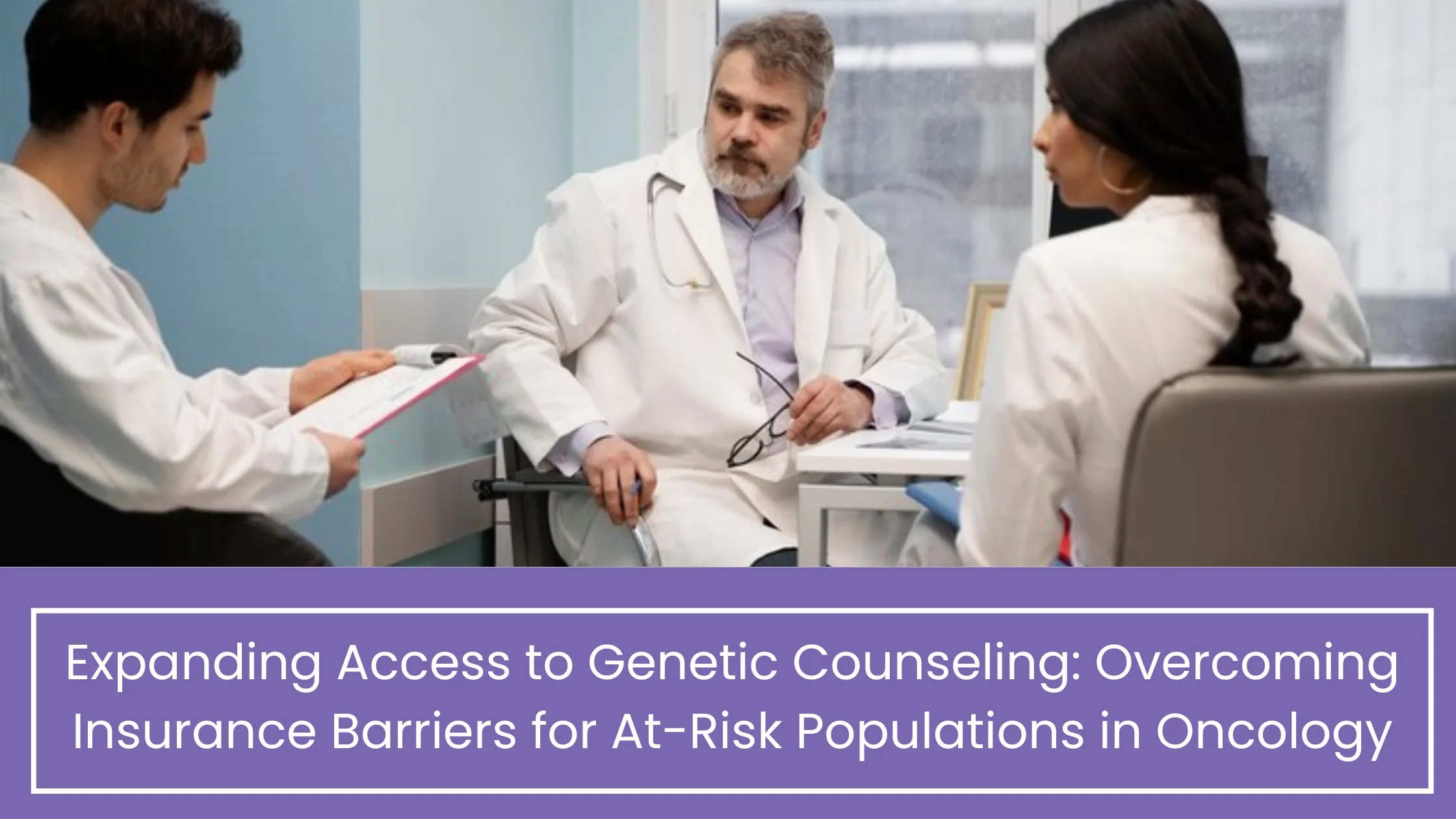Expanding Access to Genetic Counseling: Overcoming Insurance Barriers for At-Risk Populations in Oncology
Currently, over 10% of cancer patients undergo genetic testing to support their treatment plans. This is a growing number as more people come to sense the significance of gene makeup in treating cancer through life-saving therapies and services.
Genetic counseling is one such service that is crucial in identifying inherited cancer risks and personalized treatment methods. By having a clear view of a patient’s predisposition, healthcare providers can suggest tailored supervision, preventive strategies, and treatment preferences that can majorly affect patient health outcomes.
Despite the merits of genetic counseling in oncology, several at-risk populations encounter major hurdles in accessing these services. This article will navigate the health insurance challenges that hinder genetic counseling access and address why overcoming these challenges is critical to achieving equitable healthcare.
Table of Contents
The Impact of Genetic Counseling on Cancer Treatment Outcomes
Research shows that patients who receive genetic counseling often have better outcomes. For instance, those identified with hereditary cancer risks benefit from early detection and personalized treatment, improving survival rates and quality of life.
For instance, let us consider a 45-year-old lady, Maria with a strong family history of breast cancer. She learned she carried a BRCA1 mutation via genetic counseling. This mutation majorly increased the possibility of cancer. With this knowledge, Maria chose improved preventive measures and surveillance, catching the disease early on at a more treatable stage. Her experience outlines the life-saving potential of genetic counseling in oncology.
Identifying At-Risk Populations: Who Needs Genetic Counseling the Most?
Some populations are at greater risk of hereditary cancers, including people with a family history of cancer, those from particular ethnic communities with a clear predisposition to genetic mutations, and younger individuals diagnosed with cancer who carry a genetic component of cancer.
Unfortunately, many at-risk individuals lack adequate access to genetic counseling services. Underserved populations, including ones with lower socioeconomic status, limited health resources, and lack of insurance coverage, often encounter major hurdles to accessing critical services. These inconsistencies bring about inequitable health results and outline the necessity for the systemic shift to ensure all-inclusive and accessible healthcare where people who need it can benefit from genetic counseling in oncology.
Insurance Barriers to Genetic Counseling: A Multifaceted Challenge
One of the primary hurdles facing genetic counseling in oncology is the shortage of proper insurance coverage. Most insurance providers have yet to understand the potential of genetic counseling. They often fail to include genetic counseling in coverage services or impose stringent restrictions that make the service inaccessible to those who need it most. This is specifically true in the care of at-risk populations including individuals with a risk of cancer due to genetic and ethnic predispositions.
The financial load of genetic counseling can be gradual, particularly when there is no insurance coverage for the rendered services. For many patients, expensive genetic testing and counseling can lead to thousands of dollars in expenses. With no proper insurance coverage, the costs are often out-of-pocket which can be restrictive for certain at-risk patients, deterring them from attaining potential life-saving information.
Many insurance programs fail to include genetic counseling or hold strict conditions for coverage approval, including pre-authorization or referral from a specialist. This gap between medical requirements and insurance acknowledgment can alleviate appropriate and timely access to genetic counseling, especially for those already susceptible to genetic risks.
Revenue Cycle Management (RCM): A Key Player in Expanding Access
Revenue Cycle Management is a crucial element of healthcare that works with financial billing processes, insurance negotiations, and claims processing. By ensuring that healthcare providers are adequately incentivized for their rendered services, RCM aids in maintaining the financial sustainability and stability of healthcare practices and hospitals.
For genetic counseling, RCM plays a significant role in enhancing insurance coverage. Successful RCM methods include stringent documentation, medical coding, proactive insurance verification, and continuous follow-up on denied claims. These practices can improve the probability of insurance approval and reimbursement of genetic counseling, making them more patient-accessible.
Consider a healthcare provider partnering with an RCM expert like Practolytics to maximize their oncology billing processes for genetic counseling. Through Practolytics’ expertise, the provider was able to enhance the claims approval rates, minimize denials, and bring about timely coverage. This successful collaboration improved the financial health of oncology practice and expanded patient access to specific counseling services.
Innovative Solutions to Overcome Insurance Barriers
Advocacy for policy shifts is critical for encountering insurance challenges to genetic counseling. By pushing mandates that require insurance providers to incentivize genetic counseling and testing, healthcare staff and patient advocates can recognize services as medically needed and accessible to those who need them.
Collaborative steps among healthcare staff, insurance companies, and patient advocacy groups are crucial in enhancing coverage preferences. By working together, these shareholders can devise regulations and protocols that ease coverage aspects and reduce disparities in care access.
Technological innovations including telemedicine and digital health devices can transform access to genetic counseling. These innovations can make genetic counseling more accessible and affordable, particularly for patients in underserved and remote areas. By delivering virtual consultations and minimizing the requirement for in-patient visits, telemedicine can help alleviate geographical and financial challenges to patient care.
Building a Path Forward for Equitable Access
Healthcare providers, policymakers, and patients need to collaborate to expand patient access to the genetic counseling services. This incorporates overseeing better insurance coverage programs, employing strategic healthcare RCM workflows, and advocating for patient accessibility by pushing inclusive insurance coverage plans. These steps will ensure that all patients benefit from the given services. By acknowledging current issues and cultivating a more inclusive approach, we can bring in enhanced outcomes for cancer patients and aid patient journeys to betterment.
As we strive for improved coverage of genetic counseling in oncology, partnering with experts in exploring the complex insurance coverage landscape is crucial. Practolytics is a valuable ally in this endeavor, delivering the required expertise to improve patient access to genetic counseling services. By collaborating with Practolytics, healthcare providers can bring about improved reimbursements and enhance patient care, building a strong path forward for equitable access to critical services. To learn more about how Practolytics can help your medical practice navigate these challenges, contact us today.
ALSO READ – Breaking Down the Latest Oncology Coding Changes 2024
Talk to Medical Billing Expert Today — Get a Free Demo Now!






